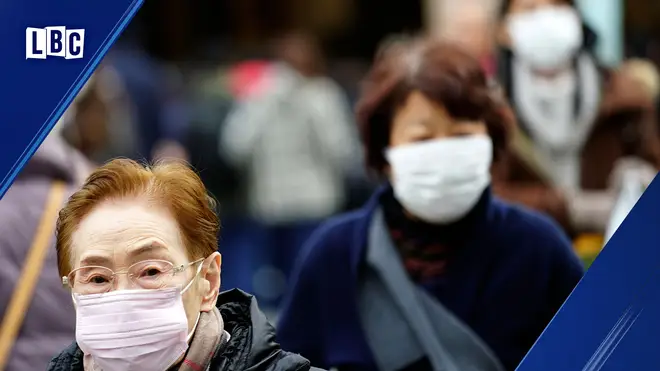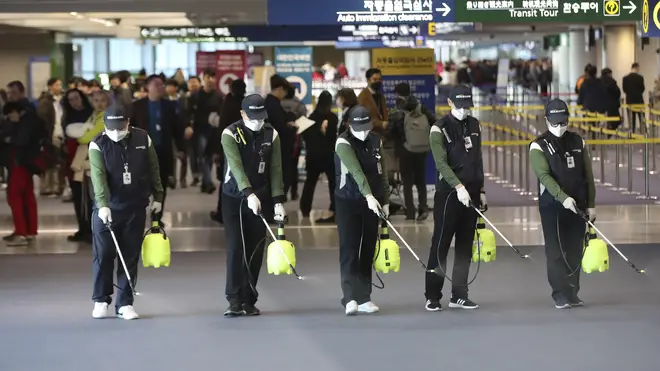
Henry Riley 3pm - 6pm
22 January 2020, 07:52 | Updated: 27 February 2020, 07:21
The World Health Organisation has declared an international emergency over the coronavirus outbreak which started in China. LBC spoke to an expert to find out how dangerous it is.
The virus started in Wuhan, China and quickly spread around the world. It has now infected people in every continent, with the exception of Antarctica.
There have been major outbreaks in Italy, Iran and South Korea.
This is everything you need to know about the virus.
Coronaviruses are a family of viruses that can cause infections ranging from the common cold to SARS - Severe Acute Respiratory Syndrome
A new type of coronavirus has originated in the Chinese city of Wuhan, which has reported thousands cases, including a large number of deaths.

The symptoms are similar to a common cold, including:
- a runny nose
- headache
- cough
- fever
- shortness of breath
- chills
- body aches
In most cases, you won't know whether you have a Coronavirus or a different cold-causing virus, such as rhinovirus.
But if a Coronavirus infection spreads to the lower respiratory tract, such as your lungs, it can cause pneumonia, especially in older people.
It has been confirmed that coronavirus can be transferred person-to-person, leading to concerns of it spreading around the world.
However, Nick Ferrari spoke to Professor John Oxford, Emeritus Professor of Virology at the Queen Mary College, and he played down the concerns it would spread quickly.
He told LBC: "The Chinese authorities say you can catch it person to person.
"But no virus in that coronavirus family is anything like influenza as regards infectivity. You'd have to get pretty close to somebody to catch it - probably living with someone. It's not the sort of virus you'll catch by walking past someone on the street."
At the time of writing, there had been 13 confirmed cases of coronavirus in the UK.
All were quarantined in hospital to try to prevent the spread of the disease.
Professor Oxford said: "I still don't think it will go global. I don't think we'll have dozens of cases in Britain.
"The cases in Korea and Japan all have links to Wuhan, where someone has been there and physically linked them to the outbreak. For it to spread wider, you'll start to see people popping up who haven't been to Wuhan.
There is no vaccine for Coronavirus.
You should treat it in the same way you treat a cold: use alcohol-based anti-bacterial soaps and sprays, avoid touching their eyes, nose and mouth and avoid contact with people who are infected.
Professor Oxford says the old-fashioned way of stopping viruses is the best defence here: "The only way to stop it is physical cleaning and social distance - keeping away from people."
He added that Chinese New Year is a worry: "The worst concern is the Chinese New Year. None of us have faced a new virus faced with so many people in a community travelling around. That's what's going to happen in China at the end of the week.
"Once they are close together in taxis or small rooms, then there may be a problem."

Thousands of people have died from coronavirus so far - the large majority in China.
In Europe, Italy has seen 12 deaths after an outbreak in the north of the country, while two people have died in France.
Severe Acute Respiratory Syndrome (SARS) is a form of coronavirus.
Some of the virus types cause less serious disease, while some - including the virus which causes Middle East Respiratory Syndrome (MERS) - are far more severe.
In 2003 an outbreak of a similar virus, SARS, killed more than 900 around the world in a matter of weeks.